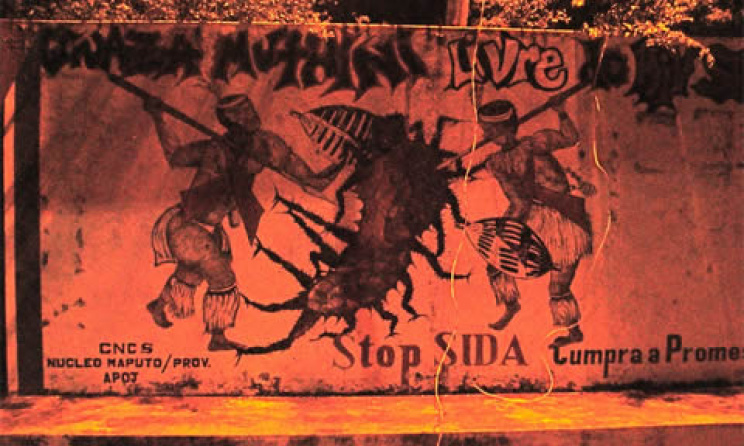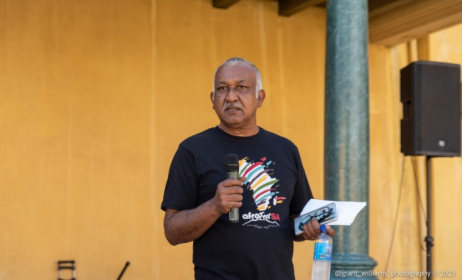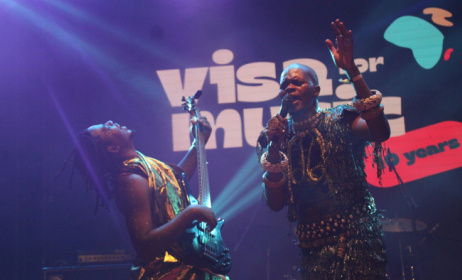The king's jam: Gwaza Muthini in Mozambique
A music festival little known outside Mozambique’s borders celebrated an incredible 117 years of existence last week. In Marracuene, 30km north of Maputo, Gwaza Muthini offers a fleeting glimpse into the last days of Africa’s kings of old.
 Tabazily. Photo: Dave Durbach
Tabazily. Photo: Dave Durbach Carlos Gove. Photo: supplied
Carlos Gove. Photo: supplied An AIDS awareness mural at Gwaza Muthini. Photo: Dave Durbach
An AIDS awareness mural at Gwaza Muthini. Photo: Dave Durbach
Once a general in Shaka’s army, Soshangane founded the kingdom of Gaza in the 1820s. His son Mzila later seized power after defeating his brother Mawewe with the help of the Portuguese. Mzila died in 1884, the year the Berlin Conference ended any ambitions of self-rule. His son Mdungazwe (aka Ngungunyane) then duly outmuscled his brother to become the last emperor. He was defeated at Marracuene on 2 February 1895, the beginning of the end of kwaGaza.
Since then, the line between winners and losers has lost its significance. Every year the locals sought to celebrate the bravery of their fallen soldiers, as did the Portuguese. Gwaza Muthini fizzled out during the post-independence civil war, re-emerging in 1994 as a fully-fledged celebration of local music and dance. The president typically oversees the slaughter of a hippo from the nearby Nkomati and the distribution of its meat for one and all. There are no more hippos to be found, so goats have to suffice. Gwaza Muthini has also in recent years been part of the national Marrabenta Festival, a two-week roadshow of popular acts moving up the coast. This year it was headlined by the Mahotella Queens, still going strong after nearly 50 years, and also coincided with the 50th anniversary celebrations of the ruling party, Frelimo.
It’s not far from home, but it’s another world. There’s minimal advertising, sponsorship or press coverage outside of Maputo. No swag, party photographers or MCs with American accents. No online programmes, golden circle armbands or imported beer. Entry is free. It’s a state-sanctioned opportunity to enjoy homebrewed amarula beer, great music and grilled frango. If this were South Africa, cellphone companies and PR chumps would’ve moved in to brand the soul out of the event and sell tickets at prices even your average ‘Shangaan electro’ enthusiast might struggle to afford. Here, even late into the night, toddlers and gogos are still in the mix, enjoying homegrown acts like Xixel, Tenito and Tabazily in his “not guilty” prison one-piece, before walking home through the dusty streets of Marracuene.
Another performer at this year’s festival was Carlos Gove, who with bands like Ghorwane has established himself as one of Mozambique’s top bass players. “Gwaza Muthini is the oldest story,” he explains. “People have been celebrating it for a long time, to celebrate the old kings of Marracuene who gave freedom for local people. They invite the spirits and make the traditional beer we call Canhu to drink, and then play the music. It’s a nice concert, especially for the local people. In the music there’s a big fusion, they’re playing different kinds of music in the same place, to celebrate this special day. Marrabenta is the base, but we play all styles.
“Marrabenta is old music and dance,” continues Carlos. “It became popular in the 1980s and still has a big impact on society. Now musicians are trying to bring it back. We have many musical styles in Mozambique. We have 10 provinces, and each province has its own styles that are different from the rest.
“But marrabenta – everybody listens to it. When we have a party it’s important to have it, because all people know how to dance to marrabenta.”
* Originally published on 20 February 2012 on Mahala.




































Comments
Log in or register to post comments